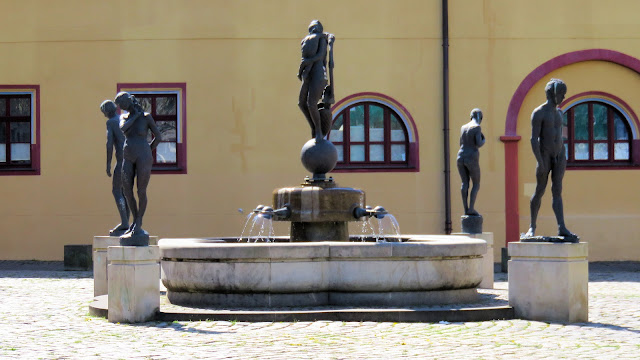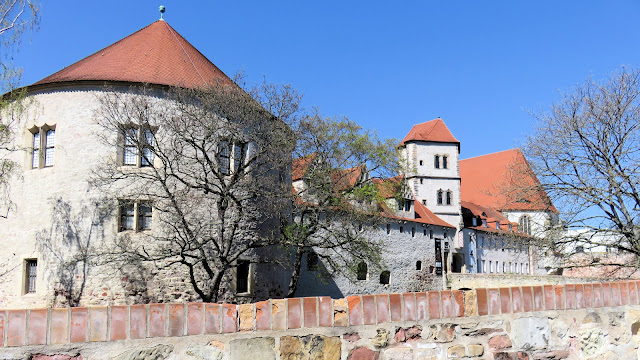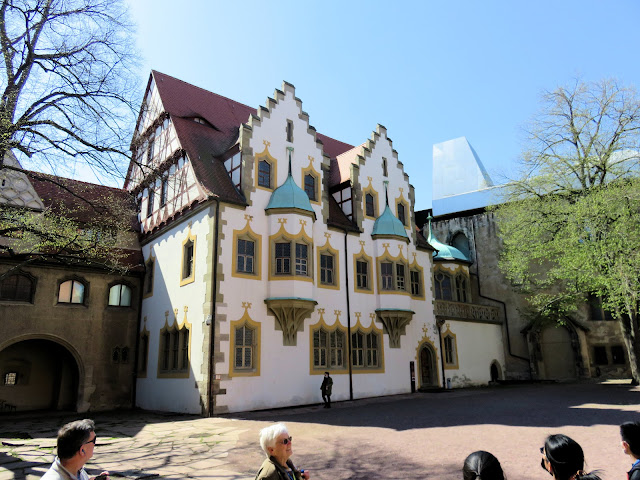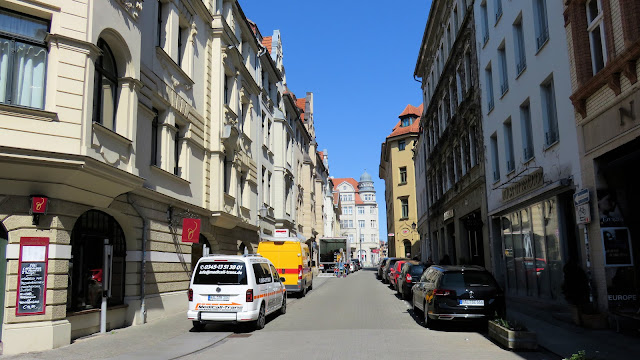Tuesday, April 19: Tour of Halle
Halle was a perfect stop for this group of touring musicians, both because the German city lies between Berlin and Leipzig and because it is the birthplace of composer George Friderich Handel (1685-1759). After the comparatively modern environs of Berlin, visiting Halle felt like time travelling to medieval Europe. This seemed appropriate because much of our tour there focused on the particularly medieval behaviors of one of Halle's most notorious leaders, Cardinal Albrecht (1490-1545).
 |
| The 1537 Marktkirche Unser Lieben Frauen (Market Church of Our Lady). |
Admittedly, that huge Ferris wheel was not particularly medieval looking.
Here we separated into smaller tour groups. My group was led by a woman whom I believe was a local history professor. On her tour, she focused on the exploits of Cardinal Albrecht.
Bluntly, Albrecht embodied everything wrong with the Catholic church of the time. He was heavily invested in the selling of indulgences ("give me money and I'll guarantee you a place in Heaven"), fixated on accumulating great wealth for himself, and had quite a sketchy reputation with the ladies. Ostensibly, his mission in Halle was to keep his Catholic flock from embracing the teachings of Martin Luther and the ways of the Reformation. But his behavior won him few adherents in town and the Reformation itself was partially in backlash to the selling of indulgences in the first place.
The Gobel Fountain depicts the history of Halle, including Albrecht's role in its development. One of the many statues surrounding the fountain (not the one pictured above) depicts Albrecht clutching at a naked woman whose facial expression clearly indicates extreme displeasure with his advances. Albrecht was clearly the Harvey Weinstein of his era. Every time our tour guide uttered his name, my only thought was, "Ugh, what now?"
 |
| Finanzamt Halle (Halle Tax Office) |
There appeared to be some kind of sculpture hanging in the Halle Tax Office atrium.
A pig. Interesting. I wondered if the Tax Office hired Roger Waters to run their marketing campaign. It seemed a curious choice of totem for the taxman.
We paused at another fountain called Lebenskreis (Circle of Life), with statues of young and old alike.
The central statue is of a mother clutching her young child while kicking death away. It is striking though not subtle.
Dom zu Halle
The Dom zu Halle (Halle Cathedral) is a former Dominican monastery originally completed in 1330. Around 1520, Albrecht got his hands on the modest structure and gussied it up to suit his more opulent tastes. When he was forced out of Halle in 1541, Albrecht took everything with him that wasn't nailed down.
With all of that said, the Halle Cathedral is a beautiful building. When I explored it, I was the only person inside except for an organist filling the space with beautiful music.
Handel, famous composer and favorite son of Halle, once served as a probationary organist here.
Moritzburg Castle
Next, we visited the Moritzburg, Halle's fortified castle. Construction began on the castle in 1479. During his time in Halle, the Moritzburg would have been Albrecht's home. For a time, it served as a repository for the artifacts Albrecht bought after swindling the townspeople with indulgences. This included 8,100 relics and 42 skeletons of saints. (Gross.)
The green area below once hosted a swampy moat.
Within the courtyard of the castle, architectural styles varied significantly.
Curious about the age of this doorway? A convenient inscription is available to supply that information.
Portions of the south and west walls of the castle were destroyed during the Thirty Years War (1618-1648) and remained in ruins until they were rebuilt late in the 20th century.
Modern materials used to rebuild the southern wall give the castle a strange, hybrid appearance. In my opinion, the incongruity detracts from the aesthetics of the place.
Across the street from the Moritzburg is the Physics Institute for the University of Halle.
From there, we made our way through the old town to Halle's Marktplatz.
Even though his presence in the picture is purely coincidental, I cannot help but think that this fellow's name must be "Neubert". Brains are weird.
Clearly, Halle was not subject to extensive Allied bombing. The city felt much older than the reconstructed Berlin.
This is a picture of me being an annoying sheep by loitering behind Randy. “Bah ram ewe!”
We arrived in the Halle Marktplatz that was dominated by the Marktkirche. There was a carnival set up in the square. After lunch, Izzy talked The Bear into going on a ride that was later described as "sketchy".
The Roter Turm (Red Tower) isn't particularly red. Completed in 1506, the clock tower stands in the Market Square at the center of Halle, adding a fifth spire in addition to the four from the Marktkirche.
 |
| A building on the Marktplatz known as Marktschlößchen (Market Palace). |
Now that is what I call a music store!
Handel Haus
In keeping with our music-themed tour, we visited the Handel Haus next. George Frideric Handel was born here in 1685. The structure is now a museum dedicated to the composer, his life, and his works.
It was a nice museum. In my opinion, an ideal exhibit would have been a Cliff's Notes narrative of the composer's life for the detail averse. It could have been delivered by a Simpsonsesque statue of Handel in Phil Hartman's voice. "Hi, I'm Georg Handel! You might remember me from such Baroque works as the Water Music Suites, Music for the Royal Fireworks, and the Messiah." Opportunity missed, Handel Haus.
The Bear and Izzy were giving me that "we're hungry" look. I was hungry, too.
A harpsichord used by the great composer. Instrumentation does not get much more Baroque than that.
Lunchtime Language Barrier
 |
| Roter Turm |
 |
| Roter Turm |
I no longer recall the name of the restaurant we found on the Marktplatz, but it was a German Subway knockoff about which the Hogwarts crew were massively enthusiastic. I made some token, "We're in a foreign city, shouldn't we find something more interesting to eat?" comments. But then I also remembered being charged by Dena and Mark to ensure that Izzy found food she was willing to eat. So, into "Subway" we went. I later encountered Yana and Zhenya who teased me with their more exotic lunch choices.
Unlike Berlin, the density of English speakers in Halle seemed low. The women at the sandwich counter were good natured, friendly, and spoke a few words of English, but they did not understand much of what the kids said.
"Point to the sandwich combination you want and don't worry about customizing it, just pull off what you don't want later," I advised. That recommendation really did not take and the ensuing, "I want X without Y and Z" orders came fast and furious at the befuddled German sandwich artists behind the counter. But in the end, everyone eventually received a tray of food and nourishment was achieved.
The Bear indulged in dessert with style.
 |
| The Bear, Izzy, Luke, Gabe, and me. |
Handel has a commanding view of the Halle Marktplatz.
 |
| The Marktkirche and Roter Turm. |
Wait...what? Woolworth was founded in Utica, NY in 1879. The five-and-dime pioneer eventually became a global company, but transformed into Foot Locker in the United States. Although the Woolworth name disappeared from US stores, it is still in use in Austria, Germany, Mexico, and the UK. Crazy.
Our visit to Halle ended where it began, on the back side of the Marktkirche with the Ferris wheel and Gobel Fountain.
The last activity in Halle for The Bear, Gabe, Izzy, and Luke was riding the Ferris wheel. When it stopped unexpectedly for a protracted period of time, The Bear fretted over missing the appointed rendezvous time with the buses. Fortunately, they made it just in time, but it is not as if we would have left without them anyway. From there, it was on to Leipzig!





















































No comments:
Post a Comment